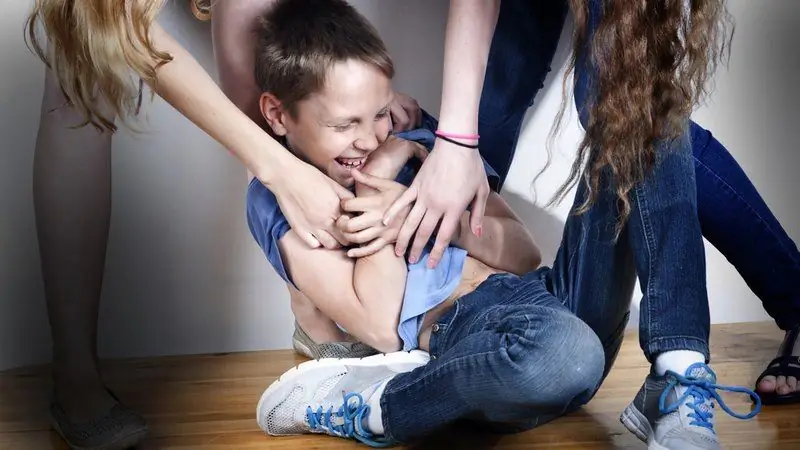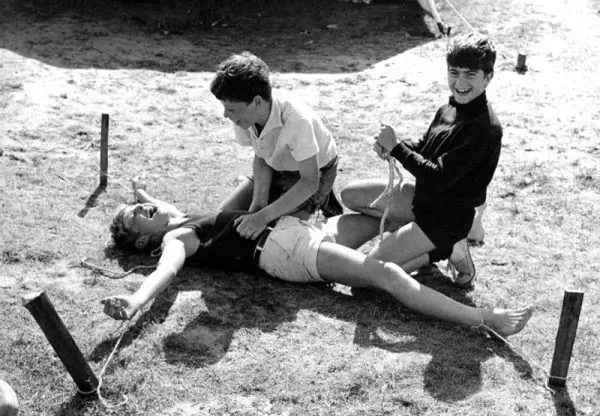
Table of contents:
- Author Bailey Albertson albertson@usefultipsdiy.com.
- Public 2023-12-17 12:53.
- Last modified 2025-01-23 12:41.
Why you can't tickle children: hidden danger and psychological problems

It is generally accepted that tickling is such a bright, pleasant, positive game, from which there will be nothing bad. Let's figure out if this is really so and whether it is possible to tickle children.
Why tickling is dangerous
The biggest tickling danger is the illusion of joy. It is clear that none of the parents wish their children harm. But seeing a child laughing loudly while tickling, there is a misconception that he is good. In fact, there is another side to this.
Physiological features of tickling
There is an opinion that one of the causes of various pains (in the elbows, shoulders, knees) comes from childhood. And this is a common tickle. The fact is that when tickling, nerve endings are involved, which send an impulse to the brain, cause muscle tissue spasm and impaired blood circulation. This does not pass without a trace, and already in adulthood, a person is faced with real health problems.
Video: what happens in the body when tickling
Psychological danger
Tickling is harmful to children, not only physiologically, but also psychologically. A child cannot always say what is unpleasant for him and physically stop an adult. At the moment of tickling, a certain pattern of behavior is laid in the subconscious, a block of helplessness and defenselessness is formed. And if this is repeated many times, the pattern is fixed. In the future, the child will not be able to protect his physical and psychological boundaries from anyone, be it an adult or a peer, experiencing uncontrollable fear and a state of helplessness. Often, a problem from childhood passes into adulthood, making it difficult to communicate with other people.
Video: why it is harmful to tickle children - the opinion of a psychologist
Why you shouldn't tickle small children
There is another opinion that tickling has a beneficial effect on the body and heals a number of diseases, for example, arrhythmias and cardiovascular failure, if the place of touch is chosen correctly. Sometimes the children themselves ask to tickle them.

Children sometimes enjoy being tickled
And how, then, to relate this to everything previously said? The fact is that in small amounts, tickling really has a positive effect on the body and mood. But the line between good and evil is too narrow.
- If a child asked to tickle him, he must stop exactly at the moment when he began to dodge and cover himself with his hands, that is, almost immediately.
-
Do not tickle children too often, even a little, if they do not ask for it. Touching the body is perceived by the brain as a violation of personal space. And if they are also frequent, then this threat will lead to uncontrollable fear in the future.

Parents, child, tickle Frequent tickling is not good for your baby
-
Small children, who can't even say anything, shouldn't be tickled at all. This can lead to a complex of all the problems described above. It is better to wait until the child grows up and ask what is pleasant for him. In this case, the child will develop a leader's thinking. In the meantime, use other ways of showing love, including through tactile contact.

Tickling baby A small child cannot say that tickling is unpleasant for him
Video: how not to do
A bit of history
In ancient countries, Rome, China, Japan, there was a sophisticated form of torture - tickling. The person being interrogated was tickled sensitive areas (heels, nipples, groin and armpits) with bird feathers or hair brushes. Sometimes animals were used to lick the treat off the human body. Goats, with their rough tongues that cause severe irritation, and small rodents were especially popular in those days. Placed on the genitals and covered with a nutshell, they zealously moved their paws over the victim's body, causing unbearable torment. A couple of hours later, the interrogated confessed to anything.

Tickling torture was used in ancient times
The practice of tickling torture was repeated in later times. So, Joseph Kohut (one of the prisoners of a German concentration camp during the Second World War) claimed that in his eyes the Nazis tickled another prisoner to death.
Now you know the whole truth about tickling and can find other ways to show sympathy for your beloved child.
Recommended:
Why You Can't Take Pictures Of Sleeping People, Including Children

Why you can't take photos of sleeping people with and without flash. What superstitions exist among different peoples
Why You Can't Why You Can't Wash Floors On Friday: Signs And Facts

Why you can't wash floors on Friday: signs and superstitions. The opinion of the mystics and Orthodoxy
List Of Millionaires And Their Young Wives - What Young Spouses Of Billionaires Look Like

List of millionaires and their young wives: spouses with a big age difference
Why A Headache Should Not Be Tolerated And How Dangerous It Is, Including For Pregnant Women

The nature and causes of the headache. Why can't you tolerate pain in the head area? Effects
Why Do Buryats Not Call Children By Their Proper Names

Why is it not customary in Buryatia to call children by their real names? National traditions of naming among the Buryat people
